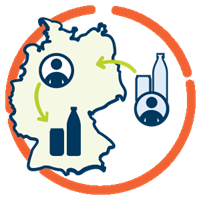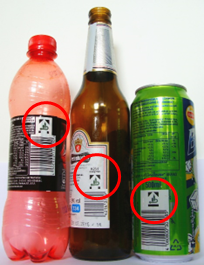Exporting to Germany - DPG and mandatory markings.

In Germany, the law for the sale of beverages in single-use packaging, effective from 2019, mandates the imposition of a refundable deposit on each package so that they can be returned by consumers to the points of sale. Upon returning the package, consumers receive the corresponding amount they paid as a deposit at the time of purchase.
To establish the necessary procedures, trade and food industry associations founded DPG (Deutsche Pfandsystem GmbH) in 2005, which provides all participants in the system with the legal and organizational framework for the so-called "deposit clearing."
Producers and importers of beverages participating in the DPG system are required to uniquely identify single-use beverage packages with the unique GTIN (Global Trade Item Number) which is represented as a barcode and assigned by the GS1 organization and its respective national offices. Additionally, in the DPG system database, all participants who are primary distributors of beverages in the country register with the international GLN (Global Location Number), which uniquely identifies them, functioning like a fingerprint for businesses.
Thus, products bearing the special DPG marking on their packaging, printed with special ink specifications, are uniquely linked to a specific manufacturer or importer. Return machines and sorting facilities read the GTIN code and create an electronic data file containing all the essential information about the product, and the package is directed for further processing or recycling.
The validity of the GTIN and GLN codes is confirmed by the service Verified by GS1.


What is a GTIN number?
The Global Trade Item Number GTIN, uniquely identifies a product to enable its distribution anywhere in the world and by any means. It follows the product throughout its entire journey in the supply chain, from production to its availability to the final consumer, without ever changing.
GTIN codes are found beneath the barcodes on almost every product in the world and are often referred to as "barcode numbers." They are also known by their former names, EAN or UPC, which actually refer to the symbology.
What is a GLN number;
The Global Location Number GLN, functions as a unique identifier in both national and international business transactions, akin to a fingerprint.
GLN serves as a unique identifier for both parties and locations, aiding in product tracking and enhancing visibility into global transactions. In essence, GLN performs for parties and locations what barcodes achieve for products. It consists of 13 digits and serves as the key for storing information about a company in databases.
When are GTIN or GLN numbers considered valid?
Verified by GS1
GS1 company prefixes and GLN codes are exclusively issued by GS1 Global and its national offices worldwide, serving as the sole authoritative source for managing and issuing GS1 codes and barcodes.
GTIN and GLN codes are registered in Verified by GS1 to enable anyone worldwide to search for and verify their validity.
![]()
Do you have a GTIN or GLN number and intend to use it for certification purposes?
Verify if it is registered and active in Verified by GS1.

Would you like to use Global Standards?
GS1 holds the exclusive responsibility for generating internationally acknowledged GTIN or GLN numbers alongside their corresponding EAN/UPC barcodes, guaranteeing the distinctive identification of products or locations.
In Greece, the GS1 Association Greece stands as the sole authorized body for this task. Founded and supervised by enterprises already using GS1 standards, its role encompasses the allocation of numbers for barcodes beginning with the prefixes 520 & 521.







